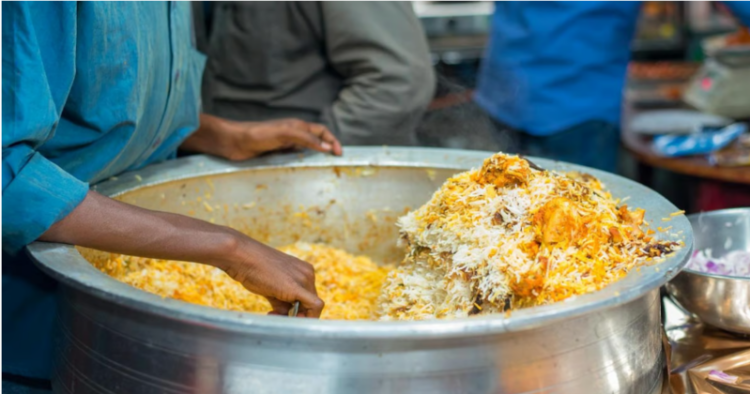Amid rising concerns over the quality of food served in biryani shops across Tamil Nadu, the state BJP has called for the installation of CCTV cameras in these establishments. This demand follows numerous complaints from customers about expired foods, the presence of worms, foul smells, and rotten food stored in freezers for extended periods.
Tamil Nadu, known for its diverse and numerous biryani stalls, has faced increasing scrutiny as patrons report alarming food safety issues. The BJP, recognising the severity of these complaints, has advocated for the implementation of CCTV surveillance to ensure better monitoring and accountability in food preparation and storage.
Historically, non-vegetarian food consumption in Tamil Nadu, particularly among Hindus, was limited to specific days or special occasions. However, over the past two decades, there has been a significant cultural shift. Non-vegetarian food, especially biryani, has become a staple for many, consumed regularly on weekends and during festivals. This growing demand has led to a proliferation of biryani outlets, many owned by Muslims, who often highlight their culinary expertise as a key attraction for customers.
The rise of biryani shops has been dramatic, with numerous establishments operating under various brand names. These include not only traditional brick-and-mortar restaurants but also mobile vans and pushcarts catering to late-night customers, particularly targeting IT professionals and night-shift workers. Despite longstanding brands like Muniyandi, newer outlets have mushroomed across the state, making it nearly impossible to find an area without a biryani stall.
However, this boom has not been without its issues. Complaints of stale and rotten food, sometimes containing live worms, have surfaced frequently. In some extreme cases, there have been reports of severe illnesses and even deaths attributed to contaminated food. Social media has been rife with allegations of unethical practices, including the use of cat and dog meat, mixing contraceptives, and spitting on food before serving it as part of certain halal customs.
In a statement, BJP spokesperson ANS Prasad highlighted the growing concerns over food safety violations in many non-vegetarian restaurants across Chennai. “Many biryani shops and other food outlets are not following proper food safety measures, leading to health issues among customers,” Prasad stated. He criticized the food safety department for its reactive approach, often taking action only after issues go viral on social media and displaying reluctance in acting against shops owned by minority communities.
Prasad pointed out that 55 percent of Chennai residents dine at restaurants at least once a week, a trend that has led to a proliferation of restaurant chains and job opportunities, including for migrant workers. However, he raised concerns about improper refrigeration, the practice of reheating leftovers, and the general neglect of food safety standards in many establishments.
“Ensuring the health of the people is paramount,” Prasad emphasized. He called on the government to enforce strict regulations on proper invoicing, sourcing of ingredients, and the use of food-grade edible oils to prevent GST evasion and protect public health. He also suggested an end to mandatory halal certification for Hindu hoteliers imposed by Muslim communities.
Prasad demanded a robust mechanism for the proper disposal of meat and food waste and an official ban on the repeated use of cooking oil. He alleged that many hotels and food stalls operate without proper licenses from the Chennai Corporation and urged the government to revoke licenses of establishments that violate food safety rules. He also claimed that even three-star and five-star hotels often fail to adhere to these standards.
Critics have pointed out that while Muslim-owned restaurants do not sell pork due to religious beliefs, they do sell beef, which is sacred to Hindus. An incident was cited where a leading food chain organized a contest offering beef biryani as a prize to school children during the Pongal festival.
Recent inspections have underscored the gravity of the issue. Food safety officials conducted a surprise raid at Anifa Biriyani in Thoothukudi, seizing significant quantities of stale and unsold food items, including chicken, mutton, fish, rice, brinjal, bread halwa, noodles, chapati, and parotta dough. Such inspections often lead to temporary closures, but Prasad criticized the government for allowing these establishments to reopen under the same name with official patronage once public memory fades.
“The officials are playing with the lives of people by colluding with such elements,” Prasad asserted. He stressed that implementing CCTV surveillance in kitchens would be a significant step towards ensuring that food safety standards are upheld, ultimately protecting the health of Tamil Nadu’s residents.




















Comments